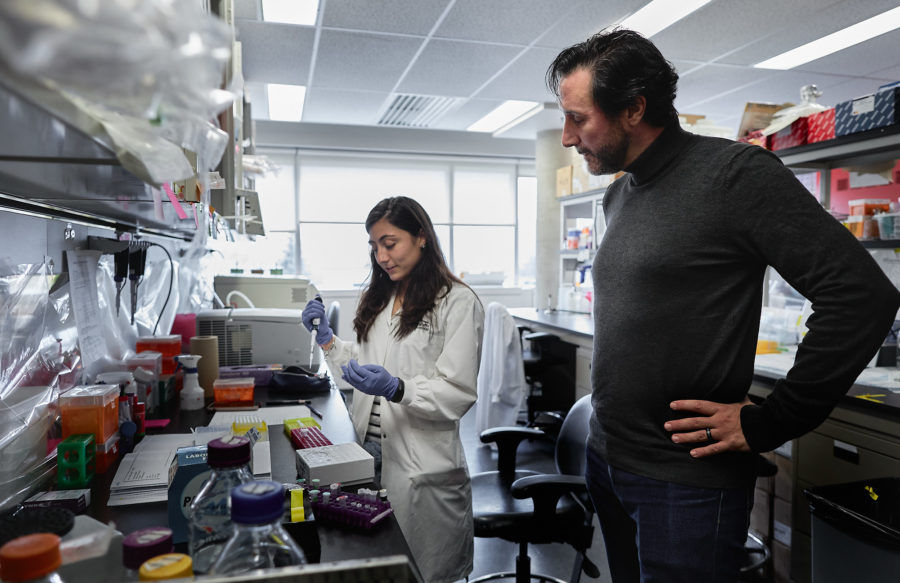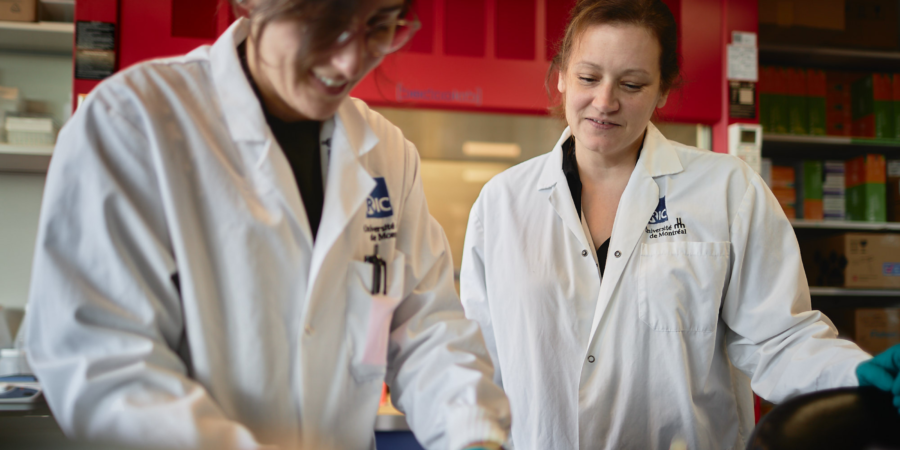Unique guidance and access to state-of-the-art infrastructures
IRIC actively participates in training the next generation of scientists by offering multidisciplinary training focusing on research, personalized supervision and privileged access to cutting-edge equipment.
Since 2003, over 1,000 Master’s and Ph.D. students, postdoctoral fellows and research interns have joined the ranks of the Institute’s teams to pursue their academic path and take part in understanding the mechanisms of cancer.
News
See all news-
-
January 9, 2025 Millénium Québécor’s Recherche Ton Impact program rewards doctoral student Madline Sauvage for her start-up company.
Madline Sauvage, a doctoral student in the laboratories of Delphine Bouilly and Sylvie Mader at IRIC, has been awarded a $6,000 bursary from the Recherche ton Impact entrepreneurial training of the Université de Montréal’s Millénium Québécor program.
-
July 4, 2024 2024 Student Recruitment Event: meeting a new generation of motivated and diversified students
The 2024 edition took place from June 5 to 7 and welcomed 32 participants from universities around the world. More than 150 interviews were scheduled this year between participants and the Institute researchers present at the event.
- See all news
A collaborative process
To choose IRIC is to choose an innovative research model that stands out through a multidisciplinary and collegial approach in order to have great impact on understanding and treating cancer. It’s also to gain access to an extended network of Canadian and foreign collaborators and to state-of-the-art research infrastructures likely to meet even the highest scientific ambitions.
Consult the list of Investigators
Our programs
IRIC offers excellence in Master’s and Ph.D. training in systems biology. We also host Master’s and Ph.D. students from other programs offered at the Université de Montréal.
Master’s and Ph.D. in Systems Biology
In the age of genomics and proteomics, emerging technologies and new multidisciplinary approaches make it possible to address cancer as a whole and provide new hope for developing treatments for the disease.
IRIC professors have developed Master’s and Ph.D. training in systems biology. These two sets of training, which are part of the Molecular Biology Program of the Université de Montréal, focus on close integration between theory and practice.

Other Master’s and Ph.D. programs
In addition to the training programs in systems biology, and in keeping with the multidisciplinary approach put forth at the Institute, students wishing to pursue their training at IRIC have access to a variety of graduate studies programs offered by the Université de Montréal.
Biochemistry
Biochemistry examines the molecular basis governing the function of living organisms.
The Master’s and Ph.D. programs in biochemistry offer flexible training with a choice of courses in cell and molecular biology, structural biology, human genomics, modern instrumentation, communication, methods in bioinformatics, management and law.
Bioinformatics
Bioinformatics is a discipline that uses and designs informatics tools to extract, organize and analyze data from living organisms.
Bioinformatics offers bi-disciplinary training combining biosciences and informatics. The Master’s and Ph.D. programs in bioinformatics are aimed at enhancing bioinformatics knowledge in one of its specializations.
Biomedical Engineering
Biomedical engineering is an interdisciplinary sector of activity whose goal is to apply engineering and physics concepts to the problems encountered in biology, medicine and health sciences.
The biomedical engineering programs make it possible to enhance technological and scientific knowledge in biomedical engineering and offer research activities focusing on biomechanics, biophotonics, biomedical nanotechnology, electrophysiology, tissue and biomaterials engineering, instrumentation and biomedical imaging, and the musculoskeletal.
Chemistry
The purpose of therapeutic chemistry is to design biologically active compounds, study their metabolism and interpret their mode of action on a molecular scale, based on the relationships between molecular structures, determined by cutting-edge techniques and also involving informatics tools, their mechanisms of action and therapeutic properties.
The chemistry programs enable students to develop theoretical and technical abilities and particularly to specialize in one of its branches, whether in pharmaceutical and bio-organic chemistry, in bioanalytical and environmental chemistry, in materials and biomaterials chemistry, or in computer-aided chemistry.
Informatics
Informatics focuses on the implementation of scientific methods to process information using computers.
The Master’s and Ph.D. programs in informatics enable students to enhance their research in the following areas: artificial intelligence, theoretical informatics, vision, computer graphics, software engineering, bioinformatics, quantum computing, stochastic simulation, and operational research.
Microbiology and Immunology
Immunology is the study of the immune system, its cellular and molecular components, and its role in fighting pathogens.
The Master’s and Ph.D. programs in microbiology and immunology make it possible to acquire knowledge in a very wide variety of areas of microbiology, including bacteriology, mycology, virology and immunology.
Molecular Biology
Molecular biology examines the operating mechanisms of cells at the molecular level.
The molecular biology programs offer interdisciplinary training, based on teachings on the cutting-edge of knowledge in the following areas: molecular genetics, regulation of genetic activity, molecular oncology, complex human diseases, development and differentiation, macromolecule chemistry, virology and biotechnology.
Pathology and Cell Biology
Pathology is based on a macroscopic and microscopic semiological analysis that compares pathological tissues with normal tissues in order to define basic lesions. With its new applications, pathology is being integrated more than ever into overall patient management by delivering, aside from the diagnosis, new data such as the prognosis and the monitoring of the residual disease.
The program offers specialization in molecular pathology and in personalized medicine that ensures coverage of the clinical and fundamental aspects of pathology by integrating histology, diagnostic pathology, the study of biomarkers and molecular pathology.
Pharmacology
Pharmacology is a science aimed at discovering new therapeutic agents that will improve health. It makes it possible to understand what happens to drugs in the body, as well as their mechanisms of action.
The programs in pharmacology make it possible to obtain specialization in neuropharmacology, pharmacogenomics, clinical pharmacology, integrative cardiovascular pharmacology or in molecular pharmacology.
Physics
Physics makes it possible to understand the way of nature in its various forms, such as the infinitely large, the infinitely small and the infinitely complex.
The physics programs make it possible to receive high-level training in astrophysics, biophysics, condensed matter, plasma physics, mathematical physics, particle physics, or in medical physics.
Submitting your application
Investigators are constantly on the lookout for fellows and students who are passionate about scientific research and who wish to actively take part in the advancement of knowledge. Please note that recruitment at IRIC takes place throughout the year. Therefore, there is no deadline for submitting your application.
-
Internship
Are you a B.Sc., M.Sc. or Ph.D. level student?
IRIC welcomes you as part of in-laboratory research internships.
Since 2004, more than 400 students from over 30 universities around the world have completed an internship at the Institute. -
Master’s and Ph.D.
Do you wish to join a competitive program in biomedical research?
The Master’s and Ph.D. programs, which are part of the Molecular Biology Program of the Université de Montréal, focus on close integration between theory and practice. -
Postdoctoral program
Do you wish to pursue your professional path by completing postdoctoral training?
Since 2004, the Institute has played host to more than 150 fellows from over twenty countries.
Events
See all events-
April 12, 2023 IRIC among the participating institutions of Science POP!
Launched in the fall of 2022, the pan-Quebec science communication contest Science POP will take off in April 2023. The fifteen participating institutions, including IRIC, will hold their own internal competitions at the end of which the finalists will advance to the provincial final, scheduled for May 27 and 28, 2023. Science POP proposes three types of challenges: popularization, valorization and mobilization.
-
January 23—May 8, 2023 Distinguished Scientist Lecture Series - Winter 2023
Conferences
IRIC presents the 35nd edition of its Distinguished Scientist Lecture Series, with a full fourteen part program.
Join us on Mondays at 11:30 am, to learn about the latest findings in cancer research with leading biomedical investigators from Canada, USA and Europe.
- See all events

Need help?
For all additional information concerning the resources provided at IRIC, please contact the Office of Academic Affairs by phone or by email.